- New population-level data shows that people with opioid use disorder (OUD) struggle to access treatment, even following the elimination of the X-waiver.
- While 78% of people looking for virtual OUD treatment have insurance, an overwhelming majority (95%) do not have a primary care physician (PCP).
- The group of young people in their 20s looking for virtual OUD treatment grew by 40% from the previous quarter.
- More than 75% of current patients surveyed sought treatment through other sources before turning to Bicycle Health for virtual care; nearly half (47%) tried a local clinic.
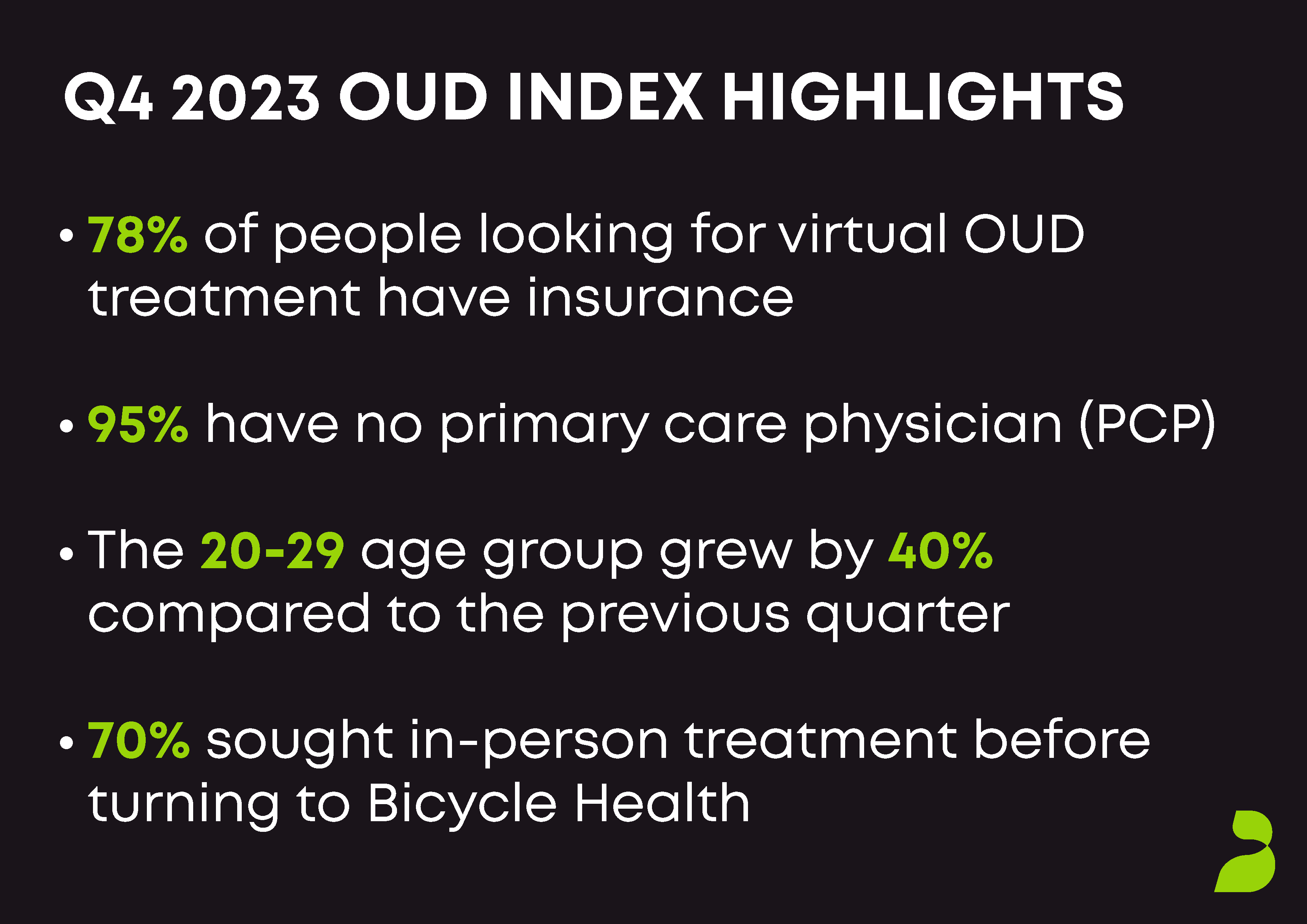
BOSTON, Feb. 14, 2024 (GLOBE NEWSWIRE) -- Bicycle Health, the nation’s largest provider of virtual opioid addiction treatment, today published population-level data on over 14,000 people who applied for Medication for Opioid Use Disorder (MOUD) Treatment in the third quarter of 2023. Bicycle Health publishes new applicant data every quarter and makes it available for download. The data in the report covers applicant demographics, insured status, path to opioid use disorder, and access to the healthcare system. Additional population-level data may be added or requested.
OUD currently impacts between 7 to 9 million Americans. More than 86% do not receive MOUD treatment, which is the gold-standard of OUD care. Lack of access to MOUD exacerbates the opioid overdose crisis. Bicycle Health’s quarterly state-by-state, population-level data updates on people seeking MOUD treatment provide insights into the diversity of this population. Population-level applicant data is available online at https://www.bicyclehealth.com/oud-treatment-index.
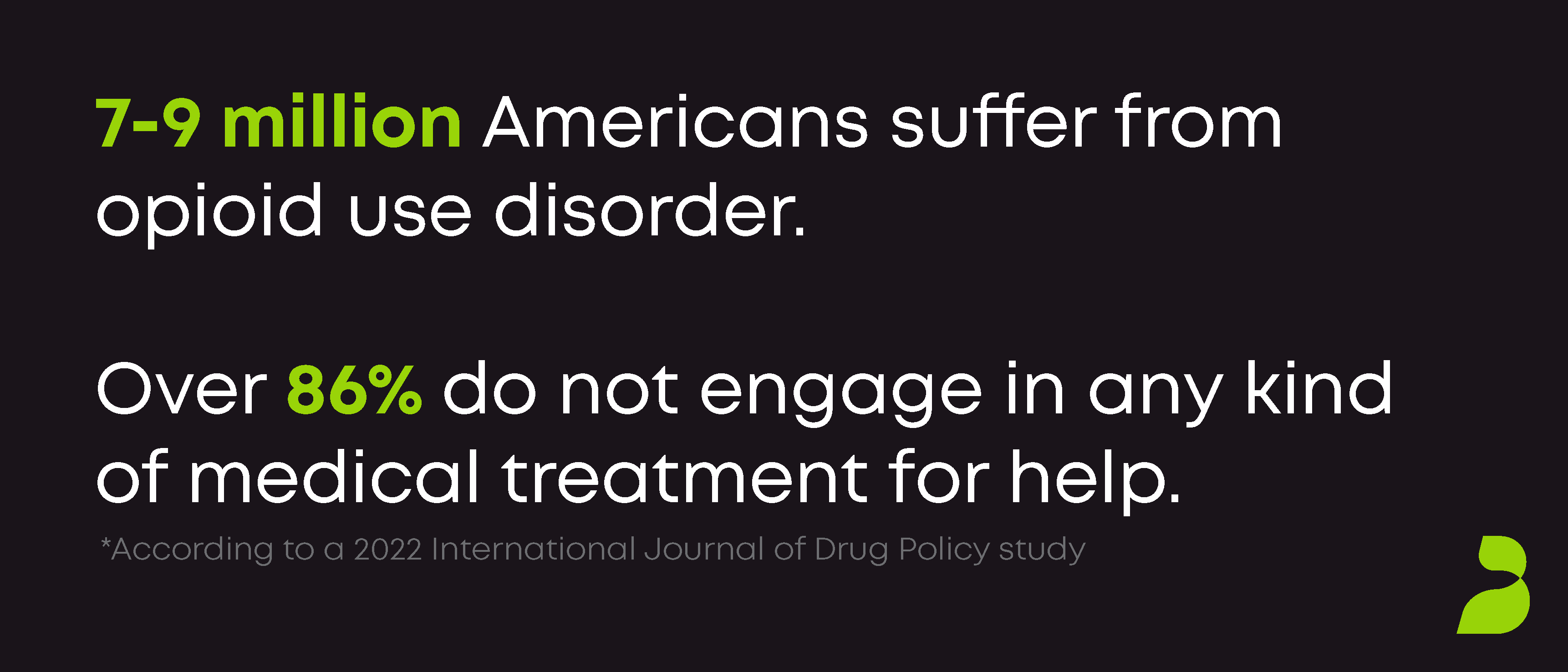
“People who struggle with OUD come from all walks of life,” said Dr. Brian Clear, Chief Medical Officer at Bicycle Health. “Every person affected by the disease should be able to access OUD care, no matter their age, socioeconomic status, existing healthcare relationships, or where they live. Virtual OUD treatment can help get care to more people while allowing patients to feel more supported by providers who understand the recovery journey.”
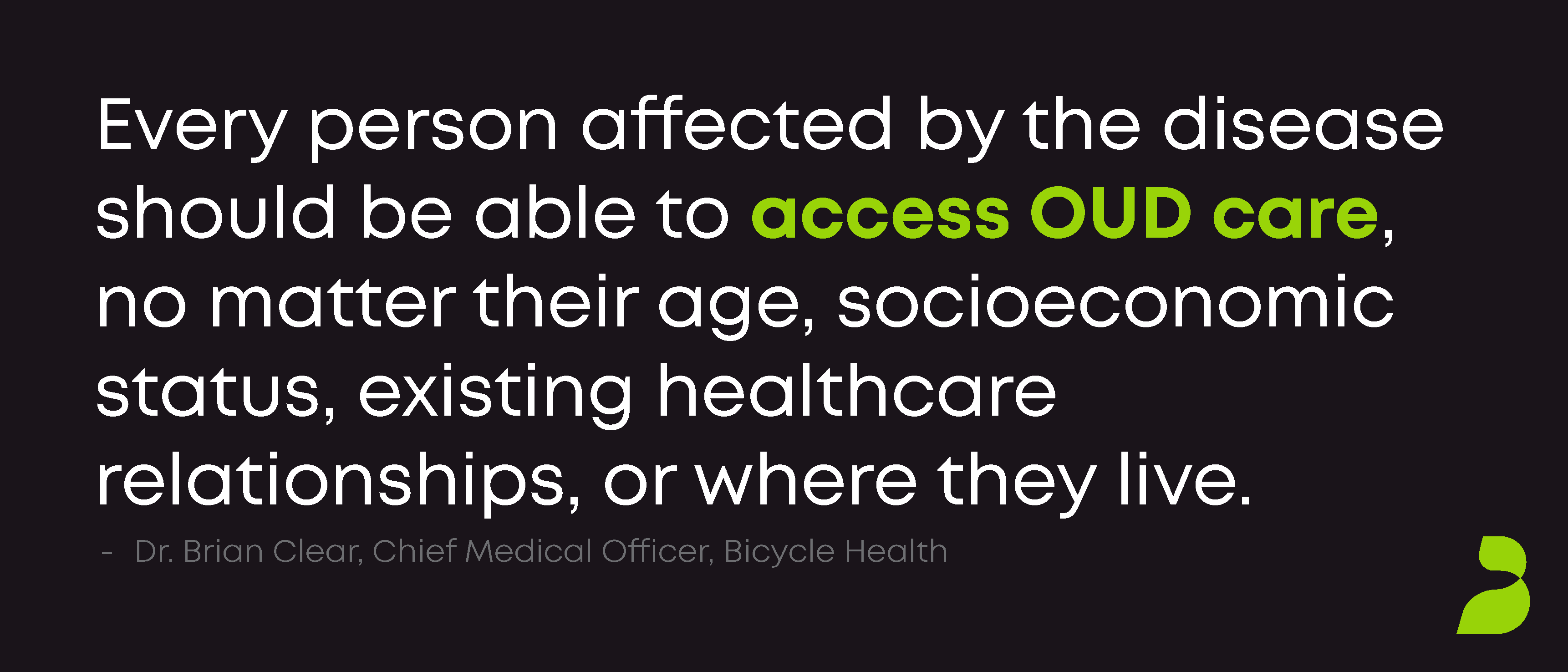
In the analysis of over 14,000 online applications for treatment, Bicycle Health found:
- Average age of applicants: The average age per applicant was 39 years old; among states with more than 100 applicants in Q4 2023, the states with the youngest average applicants were Colorado (age 37) and Virginia, New Mexico, Arizona, (age 38); the states with the oldest average applicants were Florida, Maine, and Washington (age 40).
- Age Groups: Overall, 40.4% of applicants were in their 30s; 27.5% were in their 40s; 16.4% were in their 20s; 2.5% were between ages 60 and 64; 2.2% were age 65, or older; and 0.7% were teens (18 or older).
- Age Group Growth Rate: The most significant increase in application volume came from teens (18 or older), showing a 102% growth from Q3 2023. Significant growth also occurred among those in their 20s (40.0% growth from Q3 2023) and those in their 50s (14% growth from Q3 2023).
- Uninsured applicants: Overall, 17.1% of applicants reported not having health insurance at the time of their application. Among states with more than 100 applicants in Q4 2023, the lowest percentage of uninsured applicants included Michigan (5.4%); Maine (5.5%); New Mexico (8.0%). Among states with more than 100 applicants in Q4 2023, the highest percentage of uninsured included North Carolina (24.6%); Florida (24.6%); Texas (23.5%).
- First exposure to opioids: Overall, 52.6% of applicants reported that their opioid use disorder (OUD) began with a legal prescription for pain (among states with more than 100 applicants to respond to this question). Among states with more than 100 applicants in Q4 2023, North Carolina had the highest percentage of applicants whose OUD began with a legal prescription (57.1%), and Maryland (57.1%), and New Mexico had the lowest percentage of applicants whose OUD began with a legal prescription (33.9%).
- Applicants without a primary care physician (PCP): Across all age groups, 94.8% of applicants reported not having a PCP. Among states with more than 100 applicants in Q4 2023, applicants were least likely to have a PCP in Colorado (3%), North Carolina (3%), and Oregon (3.1%). Among states with more than 100 applicants in Q4 2023, states where applicants who were most likely to have a PCP were Washington (10.7%) and Pennsylvania (9.6%).
- Applicants with a diagnosed mental health disorder: Overall, 12.4% of applicants reported having a diagnosed mental health disorder. That includes 9.8% of applicants in their 20s; 11.8% of applicants in their 30s; 14% of applicants in their 40s; 14.2% of applicants in their 50s; 14.7% of applicants between the ages of 60 and 64; 9.6% of applicants were age 65, or older.
In a separate survey of over 300 current Bicycle Health patients conducted from July to September 2023, the company found:
- Bicycle Health patients’ path to virtual OUD treatment: 77% of patients pursued other treatment options before turning to virtual care; 47.1% looked for OUD treatment at their local clinic; 35.7% tried their insurance company; 28.6% tried their primary care physician (PCP); 22.9% tried a community or faith-based treatment; 32.9% tried somewhere else; 22.9% tried Bicycle Health as their first stop.
- How much Bicycle Health patients’ spent on opioids: 39.2% of Bicycle Health patients spent over $1,000/month on opioids prior to treatment; 13.9% spent <$1,000; 13.9% spent <$800; 17.7% spent <$500; 7.6% spent <$300; 7.6% spent $100 or less.
- Bicycle Health patients’ current employment status: 38.1% of Bicycle Health patients are working full-time; 20.4% are retired; 19.3% are not working; 10.1% are working part-time; 8.3% are seeking employment; 3.9% are full-time parents.
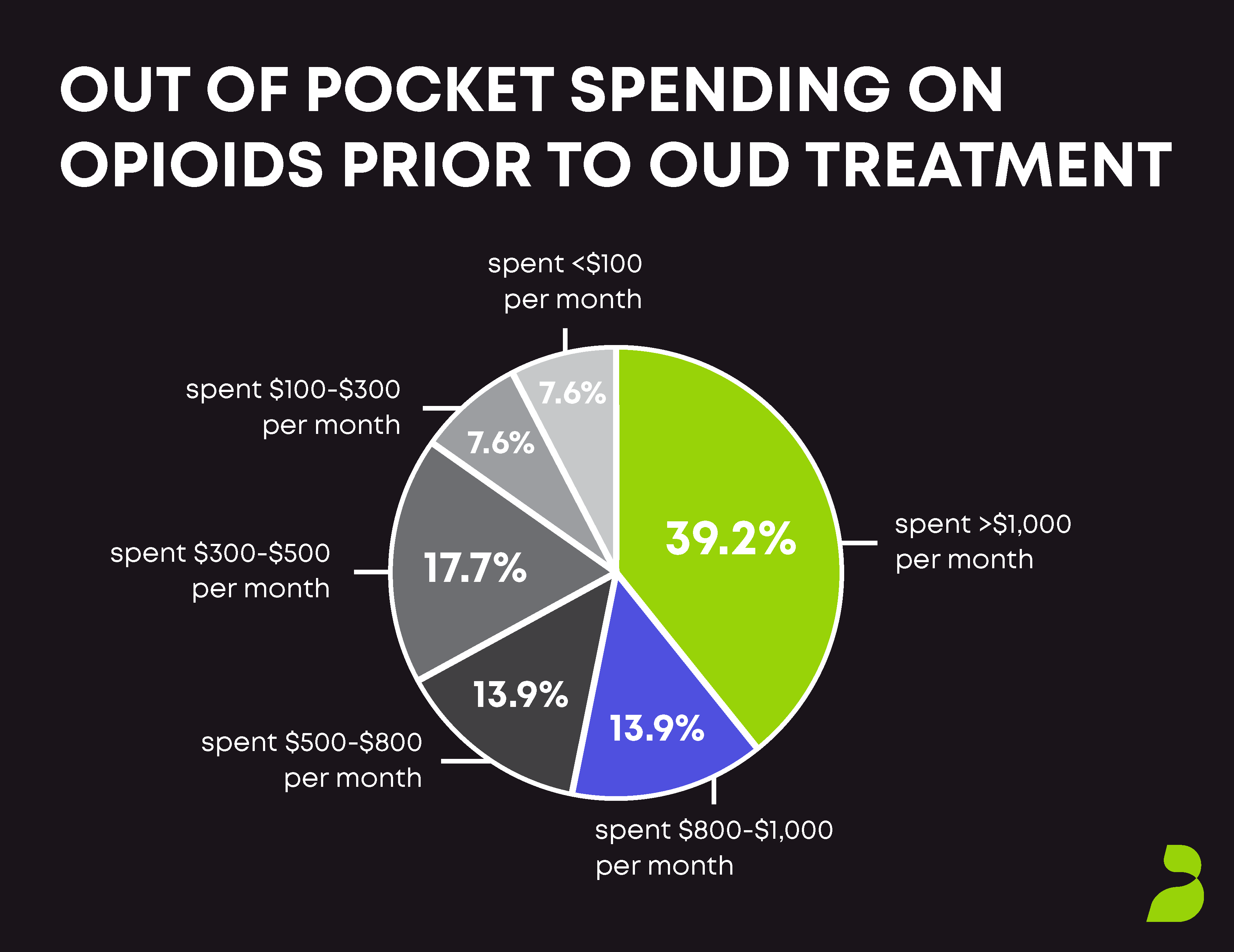
“The ‘OUD Index’ data hub serves as a tool to educate the wider industry of the barriers to OUD treatment that still exist,” said Dr. Scott Weiner, Director of Research at Bicycle Health. “If we want to help patients and the healthcare ecosystem address OUD at a population scale, we’ll need to grow our understanding of the diverse group of people impacted by the disease.”
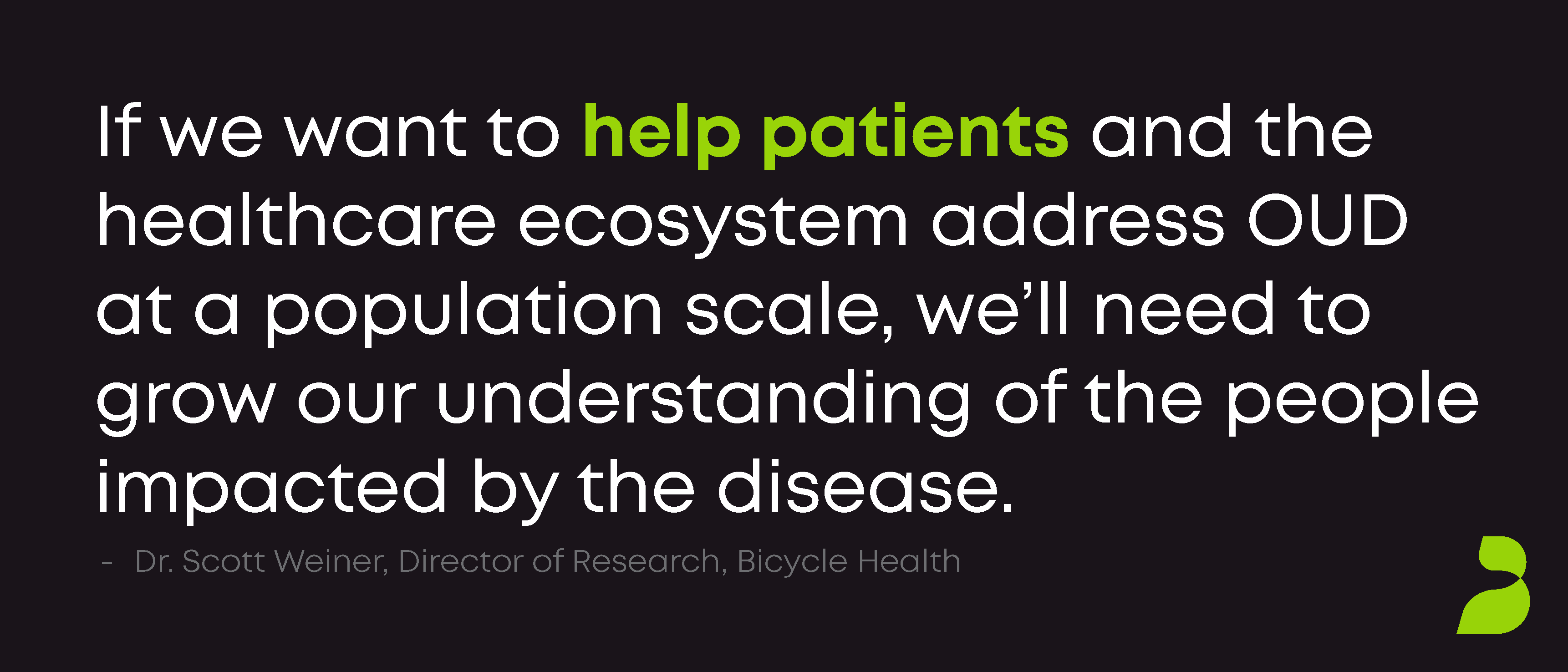
Bicycle Health publishes quarterly insights on their ‘OUD Index’ data hub. The full findings of the Q4 2023 OUD Index can be found below. To see more research, visit their website.
| Age Cohorts | % of Applicants | % Opioids Prescribed | % uninsured | % with no PCP | % with prior mental health diagnosis | % Female |
| All | 99.4% | 52.6% | 17.1% | 94.7% | 12.4% | 40.4% |
| Teens (18 & 19) | 0.7% | 8.9% | 21.4% | 96.6% | 10.5% | 42.9% |
| 20s | 16.4% | 29.1% | 15.4% | 95.1% | 9.8% | 34.5% |
| 30s | 40.4% | 48.7% | 17.7% | 94.7% | 11.8% | 40.4% |
| 40s | 27.5% | 63.0% | 17.2% | 94.0% | 14.0% | 42.0% |
| 50s | 10.4% | 70.4% | 18.1% | 94.6% | 14.2% | 44.8% |
| 60-64 | 2.5% | 77.4% | 15.4% | 96.6% | 14.7% | 39.9% |
| Seniors | 2.2% | 75.1% | 10.3% | 95.6% | 9.6% | 42.3% |
| State | Average Age | Uninsured | Path to OUD was prescription | No PCP | Has Prior MH Diagnosis | % Female |
| All | 39 | 17.1% | 52.6% | 94.7% | 12.4% | 40.5% |
| Arizona | 38 | 8.9% | 50.0% | 95.5% | 11.5% | 39.0% |
| California | 39 | 20.0% | 53.5% | 94.9% | 9.2% | 39.0% |
| Colorado | 37 | 8.6% | 49.6% | 97.0% | 11.6% | 46.5% |
| Connecticut* | 43 | 14.0% | 52.5% | 94.9% | 16.9% | 39.0% |
| Delaware* | 39 | 12.3% | 51.7% | 95.5% | 18.6% | 38.8% |
| Florida | 40 | 24.6% | 55.3% | 96.2% | 9.9% | 36.9% |
| Idaho* | 39 | 20.8% | 51.9% | 76.4% | 20.4% | 40.7% |
| Illinois | 39 | 11.6% | 58.6% | 93.4% | 13.4% | 43.5% |
| Iowa* | 36 | 20.0% | 44.2% | 93.5% | 4.7% | 38.1% |
| Maine | 40 | 5.5% | 53.8% | 94.7% | 16.2% | 34.9% |
| Maryland | 39 | 8.8% | 57.1% | 96.9% | 9.4% | 37.0% |
| Massachusetts* | 45 | 0.0% | 25.0% | 75.0% | 25.0% | 25.0% |
| Michigan | 39 | 5.4% | 54.3% | 96.8% | 18.4% | 41.3% |
| Minnesota* | 38 | 24.5% | 40.3% | 100.0% | 3.3% | 36.1% |
| Montana* | 41 | 43.2% | 55.0% | 100.0% | 17.1% | 37.5% |
| Nebraska* | 37 | 7.3% | 42.0% | 86.8% | 15.4% | 43.1% |
| Nevada* | 39 | 28.9% | 64.9% | 99.0% | 5.4% | 35.5% |
| New Mexico | 38 | 8.0% | 39.9% | 91.8% | 21.0% | 44.0% |
| North Carolina | 39 | 24.6% | 57.1% | 97.0% | 11.8% | 39.2% |
| North Dakota* | 36 | 24.5% | 33.9% | 88.1% | 20.3% | 51.7% |
| Oregon | 39 | 8.5% | 53.9% | 96.9% | 10.4% | 47.6% |
| Pennsylvania | 39 | 12.9% | 54.1% | 90.4% | 8.1% | 35.0% |
| South Dakota* | 37 | 25.0% | 51.3% | 63.2% | 7.9% | 26.3% |
| Texas | 39 | 23.5% | 52.0% | 92.9% | 12.4% | 46.0% |
| Virginia | 38 | 15.9% | 46.6% | 94.3% | 12.1% | 38.1% |
| Washington | 40 | 12.9% | 47.0% | 89.3% | 16.3% | 32.6% |
| Wisconsin | 39 | 16.2% | 46.9% | 92.7% | 12.1% | 34.4% |
| Wyoming* | 37 | 33.9% | 49.2% | 95.4% | 21.9% | 47.6% |
* indicates an applicant pool <100
| Current Bicycle Health Patients Searched for OUD Treatment Via These Channels Before Turning to Virtual Care (n=over 300) | ||
| Insurance Company | 35.7 | % |
| Primary Care Physician (PCP) | 28.6 | % |
| A Community and/or Faith-Based Treatment Program | 22.9 | % |
| A Local Clinic (in-person our out-person) | 47.1 | % |
| Nothing else (Bicycle Health was the first stop) | 22.9 | % |
| Something else | 32.9 | % |
Methodology
The applicant data presented in this report is collected from people who visit Bicycle Health’s website and answer a series of screening questions, anonymously, before moving forward with the application process and providing personally identifiable information. As Bicycle Health’s practice expands into new states or as we add new partnerships with insurance companies or health systems, screening questions asked at the state or individual level often evolve or change over time. In some instances applicants discover that Bicycle Health is not a fit for them mid-way through the application process and do not finish the pre-screening process. This occurs most often when applicants discover that Bicycle Health is not in-network with their health insurance company (yet). In instances where Bicycle Health did not have 100 anonymous responses to a specific question in a specific state, Bicycle Health marked a category’s data with an asterisk in the index tables presented here.
About Bicycle Health
Bicycle Health is America’s #1 telehealth provider of medications for opioid use disorder (MOUD), offering an evidence-based clinical care model that includes FDA-approved Medications for Addiction Treatment (MAT), access to a highly-trained team of medical experts, therapy, a customized treatment plan, and peer support groups. Bicycle Health’s mission is to address the country’s most severe public health crisis by providing access to affordable, convenient, and confidential tele-MOUD treatment for individuals in need and helping to reduce stigmas associated with opioid addiction. For more information, visit www.bicyclehealth.com.
Contact
LaunchSquad for Bicycle Health
bicyclehealth@launchsquad.com
Photos accompanying this announcement are available at
https://www.globenewswire.com/NewsRoom/AttachmentNg/f0f07a5c-7e60-4c4c-b67c-2cb2877835ee
https://www.globenewswire.com/NewsRoom/AttachmentNg/2c92ce98-d35e-40ad-86b3-b89ceff29d5f
https://www.globenewswire.com/NewsRoom/AttachmentNg/15500376-6ca9-422f-a739-159c2deb994c
https://www.globenewswire.com/NewsRoom/AttachmentNg/b6ed6db2-0ec7-4c99-9e2c-02dd511e3482
https://www.globenewswire.com/NewsRoom/AttachmentNg/dd2271dd-e925-4f2e-b9b9-9031bcce3b66
